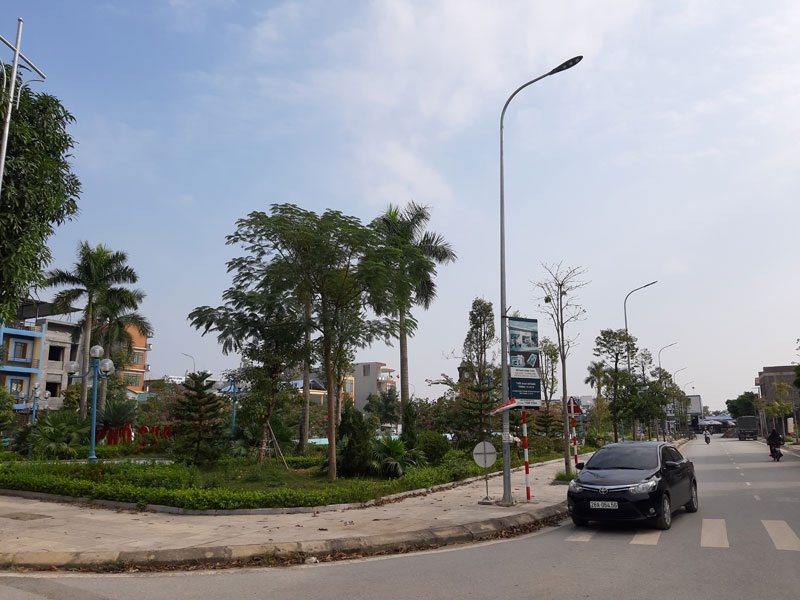
(HBO) – As of the end of 2019, Luong Son district in Hoa Binh province had completed the new-style rural and urban area building targets. To implement the resolution adopted by the provincial Party Congress, the district has mobilised more investment resources in urban infrastructure, aiming to build its centre and expanded area into a town in the future.
 The
Luong Son market and commercial residential area project that uses non-State
budget has contributed to infrastructure development in Luong Son township.
The
Luong Son market and commercial residential area project that uses non-State
budget has contributed to infrastructure development in Luong Son township.
On
November 20, 2019, the Ministry of Construction issued Decision No. 986 recognising
Luong Son township and the expanded area encompassing Lam Son, Tan Vinh, Cu
Yen, Nhuan Trach and Hoa Son communes as the fourth-tier urban area. Luong Son
township and its five adjacent communes are projected to form a town,
comprising six inner wards of the fourth-tier urban area, and the five
outskirts communes of Lien Son, Cao Son, Cao Duong, Thanh Son and Thanh Cao.
To
that end, the provincial Department of Construction has proposed the provincial
People’s Committee prioritise capital to projects under the urban development
programme by 2030 approved under the committee’s Decision No.1474 dated July
10, 2019.
The
provincial Department of Construction also urged Luong Son district to promptly
put forth an adjusted master plan in order to create a foundation for the transformation,
along with planning management mechanisms, an urban development programme and a
detailed planning scheme of central areas.
It
is crucial to turn Nhuan Trach and Hoa Son communes into wards in order to
build Luong Son town.
To
build Luong Son district into a town during the 2025-2030 period, the district People’s
Committee proposed the provincial People’s Committee adjust Luong Son’s urban planning
scheme towards expanding urban areas across the district, allocating capital to
the detailed plan of the six wards and the urban development programme to 2020
with a vision towards 2030, focusing on infrastructure development, ensuring
rural development in combination with urbanization.
It
also suggested building new industrial clusters in Hoa Son commune, investing
in infrastructure at the Nhuan Trach industrial park to create income and
attract people to work and live, and building a new market in the Luong Son
industrial park to meet demands of workers and raise the rate of labourers involving
in trade and services./.
The Standing Board of the Hoa Binh provincial Party Committee has agreed in principle on a proposal by the Standing Board of the Party Committee of Hoa Binh city to gather feedback on the city’s 1:2000 zoning plan, which forms part of its broader urban development strategy.
Hoa Binh province has made notable progress in public administration reform and digital government development, with the satisfaction index among citizens and businesses reaching over 84%, according to recent government evaluations.
Thanks to great efforts by local authorities in recent times, the governance and public administration performance of Mai Chau district has been significantly improved.
In the afternoon of June 6, the Party Committee, the People's Council, the People's Committee and the Fatherland Front of Lac Son district solemnly held a meeting to celebrate the 139th anniversary of the district's founding (1886–2025) and the 79th anniversary of the establishment of the district's Party Committee (1946–2025). There was the attendance of Mr. Bui Van Thang, the Vice Chairman of the Provincial People's Council; Mr. Quach Tat Liem, the Vice Chairman of the Provincial People's Committee; Ms. Dang Bich Ngoc, the Deputy Head of the National Assembly Delegation of the province; as well as the former leaders of the province and district through various periods, who are the natives of the district.
Implementing the Politburo’s Resolution No. 57-NQ/TW on breakthroughs in science – technology, innovation, and digital transformation is a golden opportunity for the northern mountainous province of Hoa Binh to renew growth model, improve competitive edge and shorten digital gap.
Resolution 57-NQ/TW, issued by the Politburo on December 22, 2024, identifies sci-tech, innovation, and digital transformation as strategic breakthroughs to build a developed and prosperous nation. In Hoa Binh province, this spirit is not just a slogan, it’s being put into action through concrete initiatives that form a "new development triangle”: digital citizenship, digital economy, and digital administration.



 The
Luong Son market and commercial residential area project that uses non-State
budget has contributed to infrastructure development in Luong Son township.
The
Luong Son market and commercial residential area project that uses non-State
budget has contributed to infrastructure development in Luong Son township.